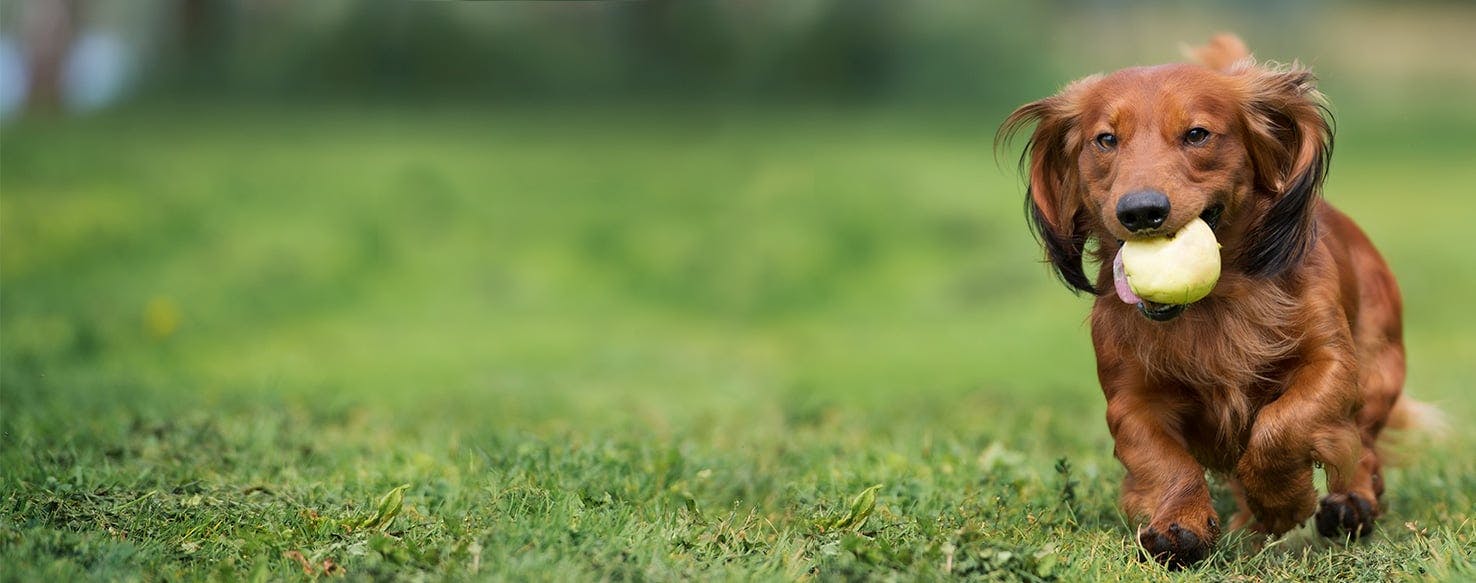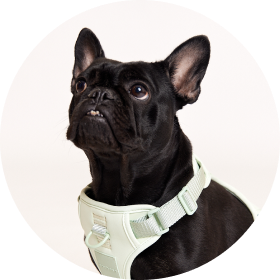- Home
- The Daily Wag!
- Behavior
- Why Do Dachshunds Chew

Common
Irregular
You drive around with a bumper sticker that says, “I love my Dachshund,” which remains true, but your dog Pebbles annoys you by continuously chewing your socks and shoes. She also keeps gnawing at your child’s colored pencils, and you’re perturbed about the money you keep forking up to replace these objects. Like many owners, you say, “No!” a lot, but Pebbles just looks at you with that fabulous canine grin. Why does she chew so much? Does it have something to do with her pearly whites? Is she trying to irritate you? Is her chewing unhealthy? You question Pebble’s actions and also want to know how to tame this behavior. It results in way too many trips to the store.
Pebbles chews for many reasons, and some of her chomping behaviors are more destructive than others. Did you know that Dachshunds were bred to hunt? Due to their fabulous burrowing skills, they would exterminate badgers and small rodents. How does this relate to chewing? Not only would Dachshunds nip at their prey, but they also would chew obstacles in burrows to get to that pesky badger. And Pebble’s innate need to chew goes even further back to her canine ancestors. They hunted and ate animals, then nibbled on the remaining bones to make sure they missed no meat. The bones themselves were sources of calcium and minerals that even domesticated dogs need to this day. Dachshunds also commonly chew when they are puppies. This is a natural behavior for all dog breeds because up until six months, this is the way canines explore the world. It’s also when they are teething. Chewing a cold washcloth relieves that teething pain, similarly to the way your baby calms down after mouthing that teether that’s shaped like a fish. Dachshunds are also very energetic and loving dogs, so Pebbles might even chew due to boredom or separation anxiety. And be aware that Dachshunds are also notorious for dental issues, so Pebble’s teeth mashing could be a way of trying to relieve a toothache.
In some rare cases, dogs develop obsessive-compulsive behaviors, such as chewing nonstop. This behavior can occur suddenly, so make sure to take your furry pal to a Certified Dog Trainer or Animal Behavioral Therapist if you observe unusual chewing behavior. Strange compulsive behaviors include eating dirt or household objects or suddenly obsessing over a random area. But also realize that there are positive reasons why Pebbles might be chewing like developing those jaw muscles and relieving stress. And don’t deny the possibility that Pebbles might just love the taste of some of her chewed-up victims, like that badger, or your $50.00 leather sandals. Know that there are ways to turn Pebble’s chewing habit into something pawsitive, and there are also ways to tame her destructive mouthing behaviors.
Need advice about your pet's health?
Get answers fast from a veterinary professional 24/7 in the Wag! App.
Get Vet ChatIf Pebble’s chewing becomes an issue due to separation anxiety (she destroys everything everytime you leave the house for your work day), then you could crate train her. This will force her to stop the chewing, but make sure to not crate her for too long. Dachshunds need at least 30 minutes of exercise a day, or they can get bored. A lack of exercise could lead to more chewing, and that’s why some owners hire a regular dog walker (Wag has an excellent service) to exercise your pooch during those days when you have to stay longer at the office. Although Pebbles may love to give you love bites and nip at your fingers, this only encourages other chewing behaviors. In other words, try to discourage and not offer praise when Pebbles nips at your toes. Additionally, be mindful of Pebble’s stress levels. Does she hate thunderstorms? Then it’s a good idea to get her inside. Your toddler repeatedly chases her and tries to bite her tail? That might be a good time actually to put Pebbles in her crate. And so on. Decreasing her stress levels should also lessen the chewing.
Although it’s tempting to scold and show Pebble’s the damage when she eats up your socks again, according to The American Society for the Prevention of Cruelty to Animals, your anger is counterproductive. Pebbles cannot connect your emotion with that holey sock. Daschunds are also known for having dental issues, so you can kill two birds with one stone by providing Pebbles with dental chews. You can find these in pet and grocery stores. In fact, there was a study done at the University of New England on how dental chews affected a canine’s teeth. The study filmed dogs eating the chews daily and also timed how long they used the products. The results? Researchers found that the dental chews reduced plaque buildup in all dogs that took part in the study. So although Pebble’s shoe gnawing irritates you and her teeth, a dental chew provides a constructive way for Pebbles to mow on something while protecting her dental health.
In addition to dental chews, provide your Dauschund with toys that don’t resemble anything tasty to Pebbles. It’s a good time to bust out Pebble’s favorite hedgehog toy but throw away the chewable sock toy since it encourages her to chew on your cruddy socks. And remember that although Pebbles is a small dog with short, little legs, she still needs around 30 minutes of exercise and play every day. Dachshunds are also smart little buggers, and mental stimulation remains vital. Doggy puzzles and teaching commands are other ways to prevent Pebbles from boredom and sharpening her teeth with your end table. Some Dachshund owners recommend hiring a dog walker for when you’re at work, providing Kongs (a durable toy), and even utilizing bitter apple spray on specific objects that you don’t want Pebbles to destroy. Apparently, bitter apple diverts your canine pal because she does not like the smell or taste. And be sure to pay attention to problematic chewing behaviors: chowing on dangerous objects, chewing that causes dental issues and/or blood, and gnawing that leads to aggressive behavior. Some of Pebble’s chewing is okay; some of it is not, but there are ways to control and utilize this behavior.
You’re feeling confident that Pebble’s jaw muscles are probably some of the strongest around. But you want her to strengthen them by chewing something else other than your precious shoes. You bought some bitter apple spray, and now your feet smell fruity while also keeping Pebbles at bay. You give her one dental chew a day, which makes her breath smell minty clean. Due to your busy schedule, you also hired a dog walking service once a day while you work. And you make an effort to get outside with Pebbles and play her favorite Frisbee game. These small steps have decreased Pebble’s chewing. You also are proud of yourself for not scolding her during the few times when she has gone off the wagon. But you forgive Pebbles for gnawing at your shoe every once in a while, and she is still your best fur-end.
Written by a Retriever lover Amanda Clark
Veterinary reviewed by:
Published: 05/23/2018, edited: 01/30/2020
More articles by Amanda Clark
